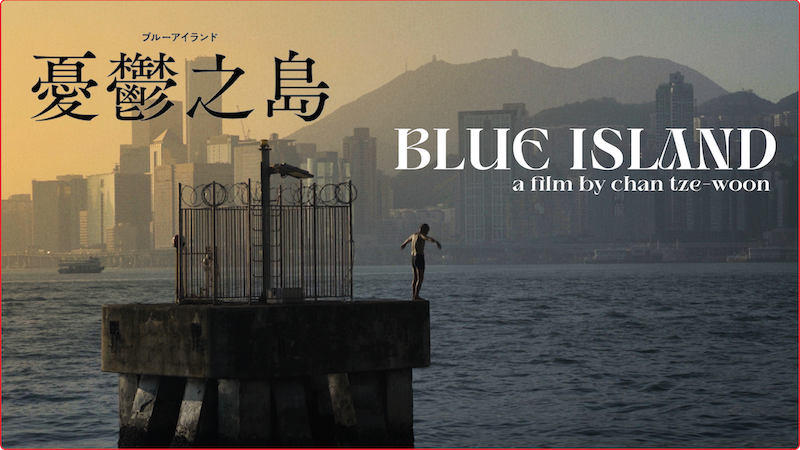Doc Corner: 'Blue Island'
 Thursday, August 4, 2022 at 6:00PM
Thursday, August 4, 2022 at 6:00PM By Glenn Dunks

Chan Tze Woon’s second feature is also his second about Hong Kong’s fight for independence. It follows Yellowing in 2016. Like many filmmakers working in non-fiction today, Chan incorporates actors and the process of moviemaking into Blue Island. This is a documentary that makes heavy use of recreations and performance, yet these are elements that are frequently weaved throughout rather seamlessly. It doesn’t always work, with some of Chan’s conceits coming and going at whim, but it becomes a smart choice.
For the story he’s trying to tell is one explicitly built around Hong Kong as an epicenter of street activism where one generation’s fighters have much to learn from those who came before. Where history becomes the present with far too much familiarity.
Blue Island is the latest in an increasing line of documentary works about Hong Kong in recent years like Ai Weiwei’s Cockroach, Olivia Martin McGuire’s Freedom Swimmer and Kiwi Chow’s Revolution of Our Time. It’s become what Syria was in the second half of the 2000s. But it stands out among those other films as a unique work of cinema, playing out at times almost like a Robert Greene film where the movie uses the prism of art as a catalyst for healing and understanding and as a way to make sense of a terrifying reality.

Here, Chan begins with actors braving an escape from mainland China to Hong Kong in the 1970s. In present day, those same performers interact with the real life refugees they portray. Chan goes even further, using a clapper board to start some scenes, including one of a Mao rally in the Chinese countryside where the actors within it debate with survivors of the revolutionary period around whether this version of history is entirely accurate. How much of the recreations and how much of the documentary is fact is probably something the viewer needs to determine for themselves, something that gets to the very heart of what I think Chan is trying to do. He asks as many questions as he appears to answer, the director is actively interrogating the story that has and continues to be told about Hong Kong whether it be under British or Chinese rule.
As a documentary, then, it is frequently fascinating and makes for continuously thorny viewing. Chan’s use of deliberately rough and unrestored archival footage within these pristinely shot 1970s recreations only forces us to consider how stories are told and passed down with fading memories and contrasting recollections. It’s not exactly a new way of telling non-fiction stories anymore, but in the context of films about Hong Kong it feels exciting. And as a plus, the recreation sequences are shot beautifully. They could have easily been their own feature had Chan decided to make something more traditional. Contemporary footage of the Hong Kong street protests is typically immersive and tough, fused as it is with further dramatizations. Chan gets great use out of the island’s visual qualities too. He makes recurring images of elderly swimmers diving into the Hong Kong harbour, a show of strength and, quite frankly, balls. He gets a lot out of drone footage, too, as well as static imagery of the many residential skyscrapers that line the tiny locality.
This form of meta-filmmaking is also a great tool with which to tell perhaps its biggest story, and that is of Hong Kong’s generations of revolution. With each new uprising of youth comes its own new take on the struggle for freedom and human rights. By integrating these multiple generations, Chan highlights the collective steeliness of Hongkongers in the face of everything they have had to endure where even a Tiananmen Square vigil is a marker for police brutality. Activists from across Hong Kong’s various uprisings interact and mingle here; a shared history of abuses of police and political powers. It is said in the movie that “Hong Kong has always been at the whim of fate.” What we see here is that seems very unlikely to change anytime soon.
I watched Blue Island after having recently just seen Fruit Chan’s breakthrough 1997 drama Made in Hong Kong. That film was about youth at the time of handover, filled with nihilism and no hope for the future. If the many teens and twentysomethings of Blue Island are any indication, that desperation is again being put to a more outwardly explosive means.
Release: Out now through Icarus Films in New York at the Metrograph including via their streaming service as of this Friday. L.A. and San Francisco to follow in two weeks. Hopefully more to come. It is also playing the Melbourne International Film Festival in my hometown, which begins today.
Award chances: Unlikely as it is probably a bit too playful with form (Robert Greene’s Procession and Kirsten Johnson’s Dick Johnson is Dead both failed to make the Oscar line-up with a much higher profile).
 Doc Corner,
Doc Corner,  Hong Kong,
Hong Kong,  Review,
Review,  documentaries
documentaries 

